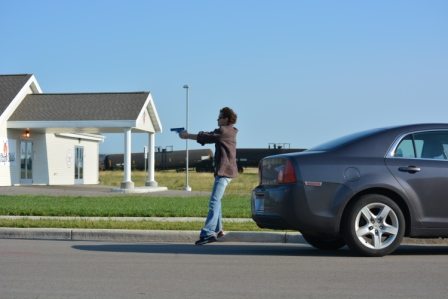Leaking Anxiety: The Mini Investigation
Attention Writers! If you’ve written a tale that prominently features cops, PI’s, bad guys, etc., then the centerpiece of your story most likely revolved around a murder or two, or three or four. Therefore, solving the murder was probably THE investigation that drove the book. In fact, most people think of major investigations—rape, robbery, B&E, murder, etc.—as the only investigations conducted by police. You know, the big stuff. Of course, those types of cases are a major reason readers continue to turn pages.
However, and please do make a mental note of this, every interaction an officer has with other people is an investigation. If you’ve ever been stopped for a traffic offense, for example, you were the subject of an investigation (if the officer was following his training). Part of these investigations include the art of understanding and interpreting the actions of humans, and sometimes animals.
People “leak” whatever it is they’re feeling and/or thinking when interacting with others. By leaking I mean they showcase their feelings with their face and/or body (body language). Police officers are trained to observe and interpret those signals.
It doesn’t take a flashing neon sign to give away an intention. Not at all. Sweating profusely, or a constant looking to the side (searching for an escape route?) are good examples of anxiety leaks. Constant hand-wringing, placing hands in and out of pockets, picking at clothing, and hair-twirling are others, to name only a scant few.
Of course, some people are naturally nervous when encountering police, but it’s the totality of the situation that could indicate a problem. Therefore, for the safety of the officer and for potentially uncovering a crime-in-progress, he/she absolutely must remain vigilant during every single stop. As part of that vigilance, officers should run through a mental checklist/mini investigation that includes not only asking questions, but observing eye movement, their hands, what they’re saying and how they say it (does pitch change, sudden stammering, etc.) does what they’ve said make sense, are they overly nervous, are you asking the right questions, why are they constantly glancing at your weapon, Why are they looking back at their car/trunk/side of the road/house, etc.
Above all, officers absolutely MUST look up from their notepads and ticket books and make eye contact. Otherwise, they’re missing one of the most important clues out there—body language. After all, nervous people act nervously, and those actions are typically not without reason.
So, when writing about cops keep these points about anxiety leaks and mini investigations in mind. Doing so could add some interesting detail to an already interesting story. Also, never forget about an officer’s “gut feelings.” It it doesn’t feel right, then it’s probably wrong. Those little hairs standing at attention on the back of his neck are trying to tell him something and he’d better listen, and so should the investigators in your stories. And, hopefully, that “feeling” will transfer off the pages and into the minds of your readers. If you can make the hairs stand up on the back of your readers’ necks, well, that’s a job done well.
Here’s a video about this topic presented by Lt. Dave Smith of Officer.com. As someone who taught officer survival for many years at a police academy, I wholeheartedly agree with his presentation.




